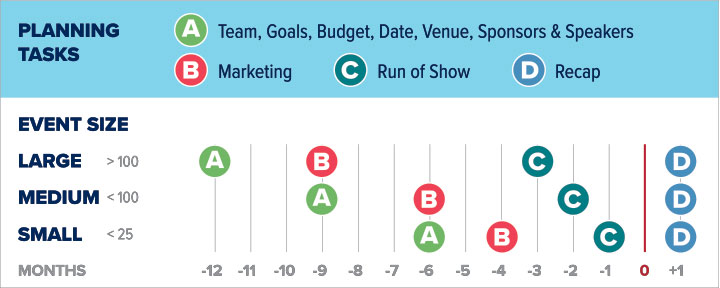Handshakes, eye contact and happy hours have driven the success of in-person events for a long time. It’s about the quality of networking and the absence of distractions that still make in-person events indispensable.
Networking Impact
Here are a few of the benefits to in-person events:
- Connect with people you otherwise wouldn’t.
- Stay updated on industry trends.
- Bring awareness to your business.
- Build strong working relationships.
- Get inspired.
Planning Timeline

Selecting Your Team
Look for people with differing skill sets to form a comprehensive team. Everyone should have a role to play and be involved from the beginning. Additionally, each person has a unique perspective to offer and more hands make for lighter work.
Defining Goals
Start with your purpose. Why do you want to hold the event? This will lead to your goals, which should support your purpose. Objectives are actionable and should be considered your roadmap to achieving your goals. Having clarity will focus your efforts.
Building Your Budget
Build your budget based on money spent and consider keeping track of your team’s time. Determine key performance indicators from the beginning and be able to analyze the event’s rate of return afterward.
Finding the Right Date
To ensure there are no conflicting events, research:
- National and religious holidays.
- Professional and academic meetings.
- The college’s important dates.
Soliciting Sponsors
Whether direct funding or in-kind donations are needed, sponsorships can be very beneficial. Finding sponsors takes time and preparation, so start early. Work with the college’s Development Office to better coordinate your prospecting efforts.
For a professional touch, put together a sponsorship package and/or media kit. Be prepared to show how their funding will be used and how your attendees support their interests.